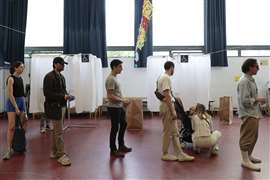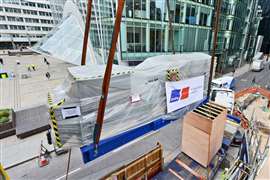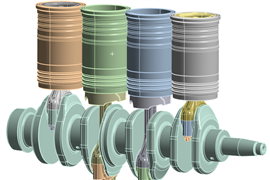Read this article in 中文 Français Deutsch Italiano Português Español
European Parliament, French elections could have impact on EU sustainability policies
02 July 2024
Elections for the European Parliament occur every five years. In the recent elections held in early June, far-right parties made significant gains. That and other dynamics could have an impact on sustainability policies across the European Union (EU). According to an Associated Press report following the elections, the parliament will likely find decision-making more challenging.
“You could say, on the one hand, there’s not a dramatic change compared to the last five years,” said Georgetown University Professor R. Daniel Kelemen, McCourt Chair at the McCourt School of Public Policy, noting that European center right, center left and liberal parties will likely remain a ruling majority. “However, the fact that the far right gained has kind of changed the mood in the parliament.”
The center right political faction, which is the most dominant force in European politics and won the most seats in the parliament, is going to feel pressure to address some of the policy issues pertinent to parties further to the right, Kelemen said.
“The two most obvious issues where we’re likely to see that shift manifest in the next five years are the immigration policy of the EU and everything to do with the [European Green Deal] and environmental policy.”
 People line up to vote in the first round of the early French parliamentary elections at a polling station in Paris, France, on June 30, 2024. (Photo: Abdul Saboor via Reuters Connect)
People line up to vote in the first round of the early French parliamentary elections at a polling station in Paris, France, on June 30, 2024. (Photo: Abdul Saboor via Reuters Connect)
He added there are those in the European Parliament who seem to be indicating they want to roll back certain environmental initiatives, such as phasing out internal combustion engines, or at least not move as aggressively on various aspects of the European Green Deal.
“It’s interesting that the far right, even though immigration is the biggest issue, has also made a big issue of environmental initiatives,” he said. “A lot of it’s in the sense that they say they’re picking up on voters’ frustrations with the economy, rising inflation and things like that. One of their ideas that they’re saying is a lot of these high costs are driven by environmental requirements, and so we need not be so aggressive on those things.”
According to Kelemen, gains made by the far right are only part of the equation.
“One of the biggest losers of the election was the Greens,” he said. “They had gotten their highest results in the election five years ago and had a big block of seats in the parliament. They really got crushed in this election — lost a lot of their seats. So, in general, that all is, I think, sending a signal.”
The European Parliament is part of what Kelemen likened to the bicameral system of government in many countries. The parliament is effectively the “lower house,” with its representatives elected by the citizens of the countries they represent. The European Council is the “upper house,” consisting of representatives from the governments of EU countries.
As such, election results in some countries could also affect policy making by the European Commission. For instance, the recent European Parliament election results in France caused President Emmanuel Macron to call for snap elections for its own national parliament.
“It would definitely matter, because again, the far right — one of their issues is environmental policy,” Kelemen said. “And they’re quite skeptical about climate change policy and the Green Deal. So, if his gamble doesn’t pay off, and if the far right wins this election, then they would have influence in the European Council.”
According to the Associated Press, the first round of elections in France that took place on June 30 saw France’s far-right National Rally in the lead with about one-third of the vote. The second round will occur on July 7.
In the near term, the European Parliament has to choose the European Commission president. Germany’s Ursula von der Leyen was recently nominated by the European Council for a second five-year term. Kelemen said this will require some negotiations on von der Leyen’s part with the new parliament.
“On the one hand, the far-right parties will be pressuring her to make concessions or make it clear on environmental issues that she won’t be so aggressive,” he said. “But then she’s getting pressure in the other direction, like the Green Party are saying we won’t vote for you for reelection unless you promise to sustain the Green Deal. So she’s getting a bit of pressure on both ends.”
POWER SOURCING GUIDE
The trusted reference and buyer’s guide for 83 years
The original “desktop search engine,” guiding nearly 10,000 users in more than 90 countries it is the primary reference for specifications and details on all the components that go into engine systems.
Visit Now
STAY CONNECTED




Receive the information you need when you need it through our world-leading magazines, newsletters and daily briefings.
CONNECT WITH THE TEAM














